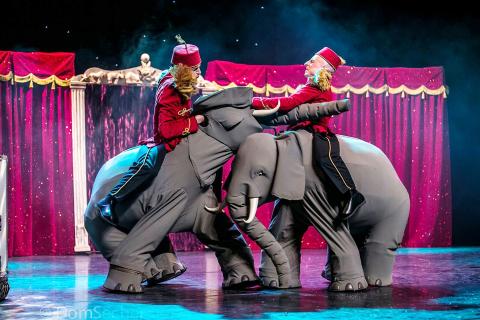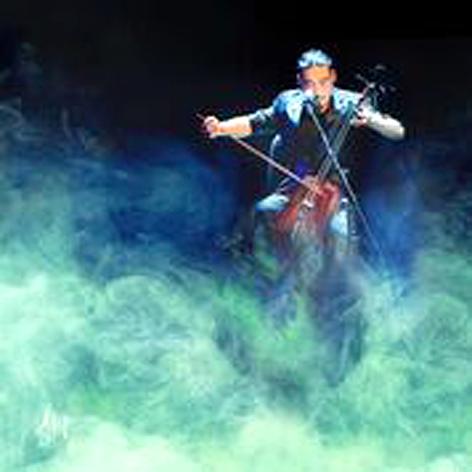The National Kaohsiung Center for the Arts (Wei-Wu-Ying) is not scheduled to open for almost a year, but that has not stopped the creative programming team that is part of the preparatory office from putting together a festival with something for almost everyone, whether you are five, 55 or 95.
The Weiwuying Arts Festival, which opens tonight and runs through Nov. 27, has more than 100 events on offer, is aimed at placing the center’s stamp on Kaoshiung’s — as well as the nation’s — cultural life .
The festival organizers want to help people realize that theater and the arts are for everyone, and everyone is free to determine what they like or don’t like. That is why they are encouraging Kaohsiung residents and visitors to “Speak Up” and make their voices hears.

Photo Courtesy of the Weiwuying Arts Festival
In addition to the seven main events, there are a variety of workshops, lectures and free activities.
There will be music of all sorts — traditional Chinese, Taiwanese modern, Western classical, even a robot opera — a variety of theater and dance performances, as well as circus shows and a Saturday night film festival.
If that is not enough to wear one out, the organizers also want to help people explore the theater of life that is Kaohsiung by linking up through the Walking connection to guided tours of five places of interest in the city. All that is needed to join one of the tours through the beginning of December is a ticket or ticket stub from any one of the festival events.

Photo Courtesy of the Weiwuying Arts Festival
Performances will be held outdoors in the Wei Wu Ying Metropolitan Park, which was opened on the site of what was once the biggest military camp in the city, as well as Wei Wu Ying buildings 281 and 285, the Kaohsiung Cultural Center’s Chihteh Hall (高雄市文化中心至德堂) and the Dadong Arts Center (大東文化藝術中心).
The main line-up includes a revival of The New Member (新社員), an original rock musical by playwright Chien Li-yin (簡莉穎) and sound designer Tao Chiang (蔣韜) that premiered in Taipei in 2014. The musical, which opens tonight for a three-show run, tells the story of a high school rock band on their journey to win a music competition.
Titan Arise, on Oct. 23, will see the National Symphony Orchestra (國家交響樂), under the baton of Gunther Herbig, performing Mahler’s Symphony No. 1, D Major and other works.
US comedian Peter Shub’s one-man show about nonsense, Stand Up and Fall Down, will be followed by the Australian production Robot Opera by Wade Marynowsk and Performance Space.
The Taiwan Dance Platform’s Chemistry (第一類化學反應), which is divided into two productions (I and II), features collaborations between Taiwanese and foreign dancers, but the shows are already sold out.
The ChiChiao Musical Theatre (奇巧劇團), which combines Taiwanese opera, rock music, Yu opera and Japan’s Takarazuka Revue style, will stage Kurama Tengu (鞍馬天狗), a retelling of Japanese novelist Jiro Isaragi’s famous tale.
And finally, South Korean traditional percussionist, Sori Choi and Taiwanese contemporary percussionist, Chen Ying-hsueh (陳盈?) have teamed up for So New, So Old, So Far, So Near.
Weiwuying is also presenting the nation’s first “Circus Platform” from Oct. 25 to Oct. 30, which features Shub’s shows and professional workshops along with street performances around the park and a chance for audiences to try juggling and other activities.
The “Mysterious Box” will feature a variety of free performances over three weekends, starting on Saturday, Oct. 22, from an assortment of 12 groups, ranging from ballet dancers and choirs to traditional theater and modern plays.
The “Hotter than the Sun Music Festival,” which will close out the Weiwuying Festival on the weekend of Nov. 26 and 27, features five groups from Taiwan and elsewhere in Asia, including audio-visual duo HH, Mongolian AnDa Union, the duo Ricing Star (米星星) and Zulu Band (祖魯樂隊) from China.
The Weiwuying Arts Festival organizers have created one of the best Web sites (waf.org.tw) that I have seen for arts and cultural performances in Taiwan, with easy to navigate pages in Mandarin and English that provide details of shows and performers, workshops and other activities, including a color-coded calendar and clear links to the ticketing Web site.

May 11 to May 18 The original Taichung Railway Station was long thought to have been completely razed. Opening on May 15, 1905, the one-story wooden structure soon outgrew its purpose and was replaced in 1917 by a grandiose, Western-style station. During construction on the third-generation station in 2017, workers discovered the service pit for the original station’s locomotive depot. A year later, a small wooden building on site was determined by historians to be the first stationmaster’s office, built around 1908. With these findings, the Taichung Railway Station Cultural Park now boasts that it has

Wooden houses wedged between concrete, crumbling brick facades with roofs gaping to the sky, and tiled art deco buildings down narrow alleyways: Taichung Central District’s (中區) aging architecture reveals both the allure and reality of the old downtown. From Indigenous settlement to capital under Qing Dynasty rule through to Japanese colonization, Taichung’s Central District holds a long and layered history. The bygone beauty of its streets once earned it the nickname “Little Kyoto.” Since the late eighties, however, the shifting of economic and government centers westward signaled a gradual decline in the area’s evolving fortunes. With the regeneration of the once

The latest Formosa poll released at the end of last month shows confidence in President William Lai (賴清德) plunged 8.1 percent, while satisfaction with the Lai administration fared worse with a drop of 8.5 percent. Those lacking confidence in Lai jumped by 6 percent and dissatisfaction in his administration spiked up 6.7 percent. Confidence in Lai is still strong at 48.6 percent, compared to 43 percent lacking confidence — but this is his worst result overall since he took office. For the first time, dissatisfaction with his administration surpassed satisfaction, 47.3 to 47.1 percent. Though statistically a tie, for most

In February of this year the Taipei Times reported on the visit of Lienchiang County Commissioner Wang Chung-ming (王忠銘) of the Chinese Nationalist Party (KMT) and a delegation to a lantern festival in Fuzhou’s Mawei District in Fujian Province. “Today, Mawei and Matsu jointly marked the lantern festival,” Wang was quoted as saying, adding that both sides “being of one people,” is a cause for joy. Wang was passing around a common claim of officials of the People’s Republic of China (PRC) and the PRC’s allies and supporters in Taiwan — KMT and the Taiwan People’s Party — and elsewhere: Taiwan and